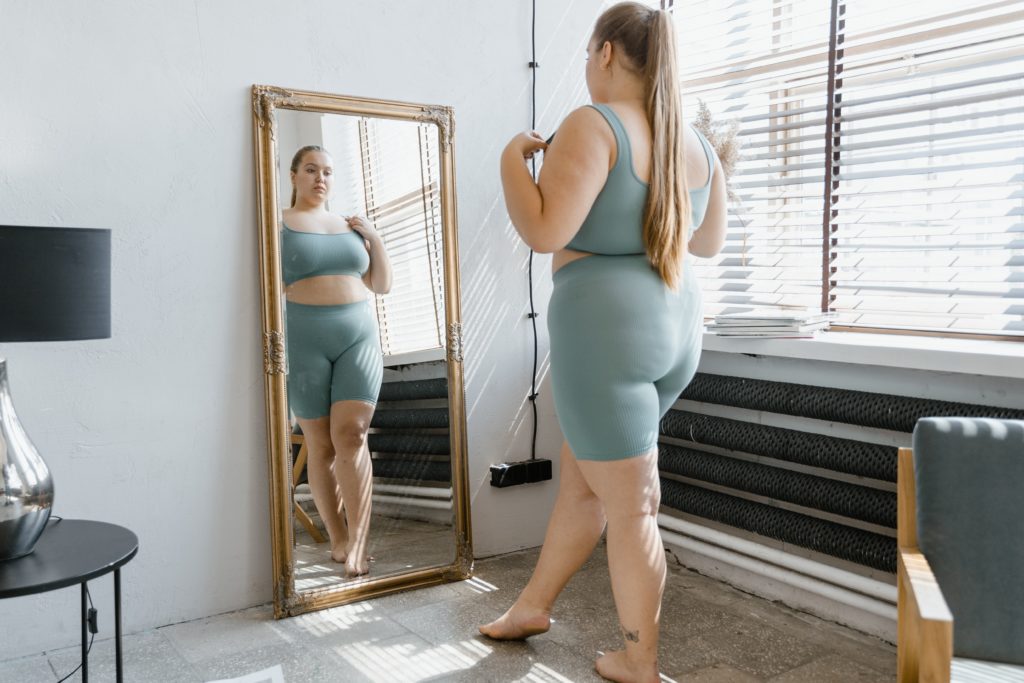The term “self-esteem” plays a massive role in today’s society. But, have you ever stopped to wonder “what exactly is self-esteem?” We know, for example, that our self-esteem links to confidence in some way, but is that it? How do you know if you have low self-esteem? Today’s post will shine a light on all those questions, and it’ll explain – in simple terms what self-esteem actually is and how to ensure our self-esteem is healthy.

Woman looking in a mirror assessing her body. Photo credit Mart Productions
What Is Self-Esteem?
Let’s start at the beginning. While some may think the answer to this question is obvious, for others, it may feel like a little bit of a “grey” area.
So, what exactly is self-esteem?
The term is deep-rooted in psychology. Self-esteem is a word that describes an individual’s perception of their worthiness. In simple terms, self-esteem is how much (or how little) you appreciate and value yourself consistently. It’s generally used to describe the level of your self-acceptance and a liking for yourself no matter the outside factors that could cause it to wave up and down.
What I mean by this is that your self-esteem is something that doesn’t change day-to day. It changes over time, and is influenced by a whole host of factors, (which we’ll get to shortly). But, if you consider the way you love a family member: there may be days where you like them a little more or less, but the way you love them remains consistent. This is the same as self-esteem.

Woman stood in a field feeling her self-esteem, and happiness. Photo credit Andrea Piacquadio
What Makes Up Your Self-Esteem?
So, what factors contribute to your self-esteem? Well, the truth is: there are hundreds of contributing factors that could cause a high or low self-esteem. Some examples are:
- Your sense of security
- Your sense of identity
- Your understanding of your strengths and fallbacks
- Your relationships with others
- Your childhood
- Your social media habits
- Your diet and its nutritional value
- Your body image
The above are only 8 examples of potentially hundreds of contributing factors that make up your self-esteem. It can be useful to pinpoint the reasons you feel your self-esteem may be low, as you’re able to change thinking patterns based on the trigger that caused the spiral. However, it’s not always imperative to building your self-esteem.
Why is Self-Esteem Important?
Those who see self-esteem as a bit of a “grey” area may roll their eyes at the importance of self-esteem. But the truth is, self-esteem plays a massive role in your daily life. It impacts the way you make decisions, the dynamics and behaviours in your romantic relationships and friendships, contributes to your mental state, and influences the way you interact with the world on a daily basis.
If you have a low self-esteem, you’ll find you’re less sure about your capabilities and that you may overthink decisions – even the smaller ones. Plus, low self-esteem tends to manifest in a lack of motivation and inspiration to put yourself “out there” and try new activities for fear of failure or being mocked.

Woman feeling frustrated due to low self-esteem. Photo credit Liza Summer
Low self-esteem can hinder and stunt a relationship’s growth, too. And it can cause intense conflict if not resolved. Low self-esteem can bring out a lack of trust, a disconnect in communication, and even build resentment.
However, there is such a thing as self-esteem that’s too high. It often creates an unrealistic expectation of yourself and piles on too much pressure. Plus, perfectionism – which is linked to an overly high self-esteem – can cause frustration, burn out, and a general sensation of failure.
A healthy self-esteem is one that is not too high, but not considered “low”. Those with a healthy self-esteem understand and use their strengths to navigate the world, maintain relationships with others, and are able to communicate their needs in society.
Where Did Self-Esteem Come From?
Self-esteem isn’t static. It’s not something that we’re born with and remains unchanged throughout our lives.
Your self-esteem will have heightened and dropped, ebbed and flowed, throughout your life. It’s on a fluctuating scale that adapts throughout time.
But those with healthy self-esteem will have fewer “downs”, and less of a rollercoaster loop-the-loop-like pattern.
The way we view ourselves will change as we mature from childhood to adulthood. The people we choose to interact with will influence the way we feel about ourselves, as well as the experiences we encounter along the journey of our lives.
Think about your childhood. Consider the way you were treated by family members, teachers, and our friends. Remember a time you struggled to do something in class. And equally, a memory that celebrated your skills. These will have all influenced your self-esteem’s journey and fluctuations.
In childhood, there are elements and experiences that will have positively impacted your self-esteem:
- Feeling heard
- Receiving adequate and positive attention from others
- Being forgiven for mistakes
- Communicating with others, and being spoken to in a respectful way
However, there are also experiences that would’ve impacted your self-esteem in a negative way throughout childhood:
- Feeling as though you’ve been criticised unfairly
- Abuse in any form (physical, sexual, emotional, or mental)
- Feeling ignored or as though you have been teased (it’s not always “harmless” teasing)
- An unrealistic expectation of succeeding constantly, and being treated as a failure when struggling with certain tasks
How to know if you have low self-esteem
Clearly, self-esteem is important. It influences the way you experience life. So, whether you have a healthy, overly-high, or low self-esteem, the way you interact with the world will differ.
But how do you know if you have low self-esteem? What are the symptoms or signs of low self-esteem?
If you have any of the 5 following symptoms, chances are you need to do some work on building your self-esteem.
1. Little Or No Self-Confidence
Confidence and self-esteem are not the same thing. Think of self-esteem as a theme park, and confidence as one of the rides. Self-esteem captures the entire atmosphere, while confidence is one of the elements that is there due to self-esteem.
It’s common for those with low self-esteem to present low levels of confidence. Ask yourself this simple question:
Do you feel that you can rely on yourself to navigate different things you’ll encounter in life?
If the answer is “no”, your confidence levels need work.
Self-confidence is largely about trusting yourself to get yourself through different situations. If you feel untrusting toward yourself, your self-confidence and belief will be low.

Woman in Green Coat Standing on Sidewalk suffering with low self-esteem. Photo credit Mikhail Nilov
What to do about it:
If you feel you have low self-confidence, start by focusing on 2-3 skills that you know you’re good at. Whether that’s a physical skill, like drawing, or an emotional skill, like listening, is up to you.
Determine how those skills influence your life, and the lives of those around you. Try to prevent your inner-voice telling you that they don’t matter. Every single one of your strengths makes you unique.
2. A Lack of Self-Control
Low self-esteem has a direct impact on our sense of control. If you feel that you’ve got little control over your life and what happens to you, it may be due to your self-esteem telling you that you’re unable to make any positive changes for the better.
This perceived lack of self-control links to anxiety, which is one of the reasons why those with low self-esteem are at higher risk of suffering from anxiety.

Sad women hugging at home. Photo credit Liza Summer
What to do about it:
Feeling like you have no control over your life can be mentally and emotionally debilitating. If this sensation is building and impacting daily life, please see your GP and ask for help.
To help yourself, you can also create a daily routine. Write down 3 tasks you wish to achieve every day, and you’ll find that, once you tick them off, you’ll feel a sense of control. However, it’s important that, if you feel anxious, you speak to a doctor.
3. Comparing Yourself to Others Frequently
Everyone – at some point – has done this. Particularly nowadays where social media is a part of our daily lives.
There are many articles that state that social media is bad for our mental health. However, in my humble opinion, I believe that – when you have a healthy self-esteem – you’re able to use social media responsibly.
That said, if you have low self-esteem, you’ll find that you may be comparing yourself to others frequently. This doesn’t necessarily need to be via social media, but it often is, simply as it’s so easy to do nowadays.
Social comparison can hinder your sense of self-worth, because you’re looking at the lives of others (or image of others) and longing for what they’ve got. It can mean that you don’t see the positives in your life, and only theirs.

Sad young lady arguing during video call. Photo credit Alex Green
What to do about it?
If you find that you’re comparing yourself to others on social media consistently, and it’s negatively impacting you, consider taking a break from social media for a week or two.
Remember that, on social media, people portray the best parts of their lives. Don’t allow the presence of others to take away the present for you.
4. Being Unable to Accept Compliments or Positive Feedback
A psychological study in 2017 discovered that there’s a direct link between low self-esteem and being unable to accept compliments or positive feedback from others. This is often down to the fact that their inner voice feels more credible than the opinions of other people. Despite the internal voice being negative and inaccurate, you’ll trust it far more than the words of others, so you believe those who are providing positive feedback are being dishonest.

Multiethnic women having conflict in kitchen due to one woman not being able to take feedback. Photo credit Liza Summer
What to do about it?
This isn’t easily fixed, and it takes serious work on your part. The next time you receive a compliment or positive feedback, don’t wave it off. Instead, make it a priority to say “thank you”. Don’t shake your head. Don’t make a face. Just say “thank you”.
Once that feels a little more natural, try giving yourself a compliment. It’ll feel awkward and uncomfortable to begin with. However, the more you do it, the easier it becomes.
5. Focusing on Flaws, Not Strengths
If you’ve got low self-esteem, you’ll find that you struggle to say positive things about yourself. Instead, you beat yourself up frequently, finding a fault with either your physicality, your sense of self, or your capabilities.

A Woman Looking at Her Reflection while Holding a Ceramic Mug focusing on her flaws. Photo credit Kevin Malik
What to do about it?
Changing your mindset is no easy task, and it’s not something that happens over night.
The next time you find your inner-voice being critical, stop her in her tracks and replace it with something positive.
For example, if you were looking in the mirror, and your inner voice tells you that you’ve gained weight, you can switch that to “I look healthy”. Saying it out loud can feel awkward, but the impact will be stronger over time.
Bit by bit, it’ll become easier to turn a negative into a positive. Though it will take work, and it begins as an awkward and uncomfortable task.
The 3 “Faces” of Low Self-Esteem
Low self-esteem is a villain in our stories. But she can be dressed up in 3 different masks. That’s why it’s not always easy to recognise.
The 3 faces of low self-esteem are:
The Imposter
The imposter is tricky to spot because it’s appears to be fulfilled, happy, and successful. However, deep down, there’s an intense fear of failure, and a sensation of not being worthy of their success so far.

A Woman Sitting on the Bed feeling like she has to mask. Photo credit Ron Lach
The imposter is a parasite that causes the person to be paranoid that others will discover their unworthiness. They need constant success to prove to themselves that they’re worth their wins in life.
The Rebel
The rebel manifests inside a person by causing them to roll their eyes at people in authority. They’ll act as though the positive impact and actions made by others – specifically those with authority – don’t matter at all.
Under the surface, though, they’re living a constant battle with their anger, because they just feel like they’re not good enough.

Woman putting other people down whilst pointing finger in face at home. Photo credit Liza Summer
They often go out of their way to tell people that the opinions of others don’t matter to them. The truth, though, is quite the opposite. The way they handle this is by breaking rules and laws, going against authority, and blaming others for little to no reason.
The Victim
The final mask worn by low self-esteem is the victim. These people often act as though they’re unable to cope with the way of the world, and is waiting for someone to rescue them. However, when people try to help, they’ll put a further problem in the way of a solution.
They’ll use self-pity to place a bubble between taking responsibility for their actions and making changes for their lives. They rely on others too much with no clear boundaries, and it often spirals into having no sense of assertion (being walked over), underachieving due to relying on others too much, and strained relationships.

Woman Covering Her Face With Her Hands. Photo credit MART PRODUCTION
Can you change your self-esteem?
Yes, you can change your self-esteem.
It’s not something that is set in stone as you reach adulthood.
Growing your self-esteem takes work. However, it’s absolutely worth it, as it’ll drastically improve the quality of your life.
There are ways you can work on your self-esteem at home. Equally, you can work with a self-esteem coach to fast-track the process. A self-esteem coach is well versed in the activities and psychological reasoning behind them to build and grow your self-esteem.
Looking for a self-esteem coach? Why not book a free Introduction Call so we can chat through your self-esteem goals?

Hey I’m Natalie, Supporting women like you on their road to self-acceptance and building a positive body image.

[…] It focuses on your appearance, and how you think and feel about your body. However, your self esteem focuses on you as an entire person. It may include your body image and appearance, but it runs […]
[…] when used without thought and care – will hinder your self-esteem. If you already have low self-esteem, social media has the potential to make it […]
[…] So being able to shift yourself into a state of self-compassion is a must for your mental health and wellbeing, but also your self-esteem. […]
[…] is a key component of healthy self-esteem and a powerful way to silence your inner […]
[…] to truly build your self-esteem and find body acceptance, being able to shift your thinking is 100% necessary, and you can do it. […]
[…] you’re struggling with low self-esteem of poor body image it’s very likely that you feel a pressure or drive to look a certain way, be a […]
[…] your self esteem and body […]
[…] statements or self talk that are used to challenge negative thoughts and beliefs, and to build self-esteem, confidence and motivation. Positive affirmations describe an outcome or change that you desire in […]
[…] habits. In addition constantly comparing yourself to others online can lead to feelings of low self-esteem, anxiety, and […]
[…] third habit essential for nurturing healthy self-esteem is celebrating our victories, big and small. It’s important to acknowledge things that are […]
[…] in self-care practices can help you feel good about yourself and boost your self-esteem. When you take care of yourself, you’re showing yourself that you’re important and […]
[…] Many of us believe that practicing gratitude improves our physical, mental, and emotional well-being. But how exactly does gratitude contribute to building self-esteem? […]